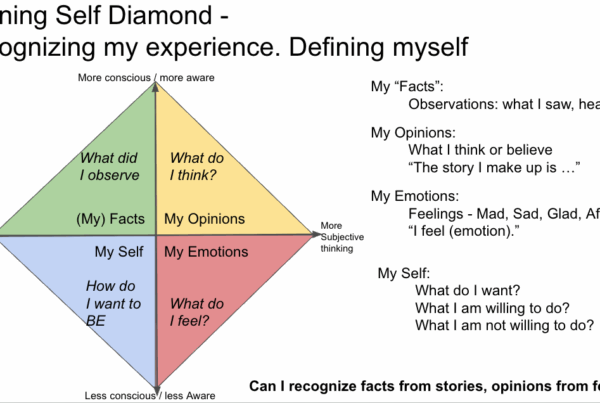
The Maturity Point: That Moment You Choose to Step Up
We all hit it—that moment. You’re facing something uncomfortable—maybe it’s a task you’ve been putting off, a conversation you’ve been dreading, or the decision to stop scrolling and start doing. Inside this experience of being stuck, or wanting to avoid, is what I call The Maturity Point.
It’s the spot where techniques and productivity systems stop working. They might help you reach the edge, but they can’t carry you over. At the maturity point, you’re up against your immaturity, and only conviction, clarity, and a sense of personal responsibility can move you forward.
What It Looks Like
It’s not dramatic. It’s subtle. One has to pay attention to notice it.
You feel the tug to avoid. Your brain starts negotiating by diverting you with avoidance behaviours that are less threatening and less effort:
“Maybe I’ll just check my email first…”
“It’s not the right time to tackle that.”
“Let me clean the kitchen, just real quick.”
These are soothing behaviours. They’re easier, less risky, and more comfortable in the short term. But they don’t get the hard thing done. And often, avoiding the hard thing creates more significant problems later. It’s the body and brain doing what they evolved to do – protect us from the discomforts of all kinds. The brain uses a straightforward formula – if it might be hard or hurt me, avoid it.
The Maturity Continuum
Like most things in biology, the maturity point is based on a continuum from a lower level of emotional maturation to a higher level:
– Less Emotionally Mature: One focuses more on feelings, short-term comfort, and what others think, all the while trying to avoid tension.
– More Emotionally Mature: One focuses more on functioning, growth, and taking action despite discomfort. This is taking responsibility and is far less concerned with what others think.
Emotional maturity is not about being perfect. It’s about choosing to show up with more clarity and conviction, especially when a situation is hard. “This is what I’m willing to do, even if it’s uncomfortable,” is a more mature action. Taking responsibility for the part one plays in their situation and doing something about it is also a measure of emotional maturity.
Why We Avoid
Avoidance isn’t laziness. It’s protection.
When our brain senses discomfort, conflict, or uncertainty, it kicks into threat response mode and steers us toward safer, easier options. This is emotional logic. It is often not logical, as in rational or factual. But the ancient brain circuits understand little more than simple concepts like effort, work, and danger. The brain must recognize anything like these because it must send signals, preparing us to act now. It triggers the release of chemicals so we can respond to effort (running), work (carrying), and danger (fighting). These chemicals create a sense of unease and discomfort, which helps to get us moving. We might feel anxious. So what does the brain do next? What it is designed to do. The brain directs us to less effort, less work, and more safety. It directs us to comfort. And we feel soothed.
But here’s the catch. Soothing behaviours can be more dangerous in the long run.
Whether it’s procrastination, numbing out, or backing away from meaningful challenges, these choices come at a cost. And the price is often progress, integrity, and growth. The circuits in our brain that support will and perseverance get weaker. We don’t get things done. We can get into a negative avoidance cycle. This is where the maturity point comes in.
The Choice Point
Here’s the good news: You will hit a Maturity Point whenever you are up against something you don’t want to do. This is the moment where you get to choose. You might not like the options, but you do get to pick something. Not deciding is one option.
Do I avoid, or do I lean in? Will I weaken my will or strengthen it? Does my immature self win, or will my mature self win?
No “productivity” system will remove this choice from you. No app or hack will do it. But you can train for it. Every time you choose the more challenging, more responsible route, you strengthen the neural circuitry in your brain that helps you persevere next time. (Yes, that happens in your mid-anterior cingulate cortex.)
Several important things can happen by choosing to go forward. First, you get stuff done. That’s a good thing.. But wait, there’s more! You grow your willpower by exercising the will to lean into and do harder things. And you learn to tolerate discomfort, which is another benefit. All of this means you grow your functional maturity by functioning up in this manner.
Defining Yourself at the Maturity Point
The process of defining oneself is also at play here. When you hit that point of tension, it’s good to pause and define yourself.
– What kind of person do I want to be? How do I want to show up around this?
>- What am I willing to do, regardless of how I feel?
>- Which is more critical – comfort or getting things done?
>- What would my most mature self tell me?
Even something as simple as doing a workout, following through on a task, or having the awkward-but-important conversation becomes a moment of maturity. You’re not trying to be responsible for someone else, but taking responsibility for yourself.
The Role of Counsellors and Coaches
For professionals working in mental health or personal development, the maturity point concept can be a helpful way to talk about a client’s functioning. Clients often present with surface-level concerns: procrastination, avoidance, and indecision. However, underneath these behaviours, there is usually a tension between comfort and responsibility.
Helping clients identify the maturity point in their lives—without shame or blame—can open the door to meaningful growth. Encouraging clients to reflect on what they will stand for and to distinguish between short-term feelings and long-term values can shift their entire approach to challenge and discomfort.
Final Thought
If you pay attention when you are struggling with getting something done, you’ll notice it—that moment of choice. It is the awareness of when you decide to either back away or lean in.
That’s the maturity point.
You don’t have to be perfect. Nobody is. But you can choose to be a little more thoughtful. A little more committed. A little more mature.
That’s how growth happens—one choice at a time.
The good news is: The choice is yours.
Dave Galloway
I appreciate your interest in thinking systems.
You can reach me at dave.galloway@livingsytems.ca
For more on Bowen Family Systems Theory, go here.


